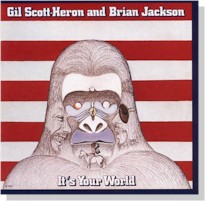Critical reception
In a contemporary review, Mick Brown of Sounds gave the album 4 out of 5 stars and stated: "Gil Scott-Heron takes another step in carving out his singular niche as jazz musician/rhetorician extraordinaire – number one in a field of one". [4] Lawrence Journal-World writer Marshall Fine commended the "fluid aggregation of musicians" and praised the album's "integrity, intelligence and an involving musical style that belies the often-bitter nature of their lyrics". [6] Village Voice critic Robert Christgau said, "If anything proves how serious Scott-Heron has become, it's the infectious groove running through all four sides of this concert album". [3]
In a retrospective review, Maurice Bottomley of PopMatters complimented the album's incorporation of "ballads, poetry, jazz solos, Latin breaks and a hip funkiness", stating "It is raw, passionate and powerful, and at all times the rhythmic pulse and the solo explorations complement the lyrical wizardry". [7] Bottomley viewed that It's Your World features Scott-Heron, Jackson, and backing ensemble The Midnight Band "at their collective peak" and wrote that it "functions both as a document of a particular historical moment and as a fresh musical experience today". [7] U.S. News & World Report hailed it a "masterpiece", complimenting its "mellow funk" and "heartbreaking sonic portraits [...] seething with indignation and sorrow". [8] Boston Herald writer Brian Coleman perceived "an upbeat and compassionate side" to Scott-Heron on the album and cited it as "arguably Scott-Heron's most fully realized work, tempering his early-70s anger with soulful wisdom and uplifting words". [2] AllMusic writer Hal Horowitz called the album "a moving listening experience" and commended its themes with respect to "its Centennial-centric time frame", writing that it "loses little of its impact... [T]hese tunes have lost none of their lyrical edge or incisiveness throughout the years". [1] Horowitz cited it as "one of Gil Scott-Heron's best albums as well as a compelling musical time capsule ... proof of the artist's musical and lyrical acuity". [1]
This page is based on this
Wikipedia article Text is available under the
CC BY-SA 4.0 license; additional terms may apply.
Images, videos and audio are available under their respective licenses.
